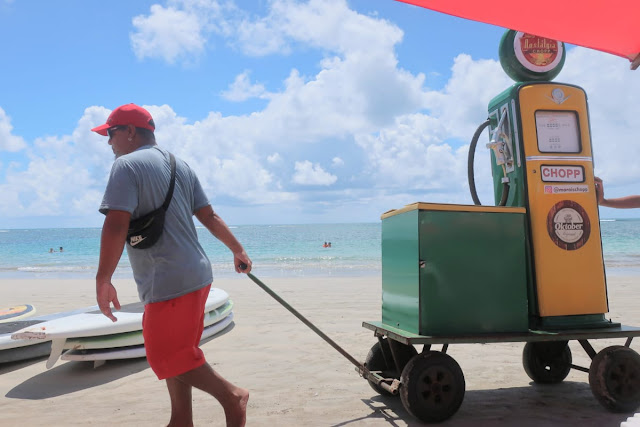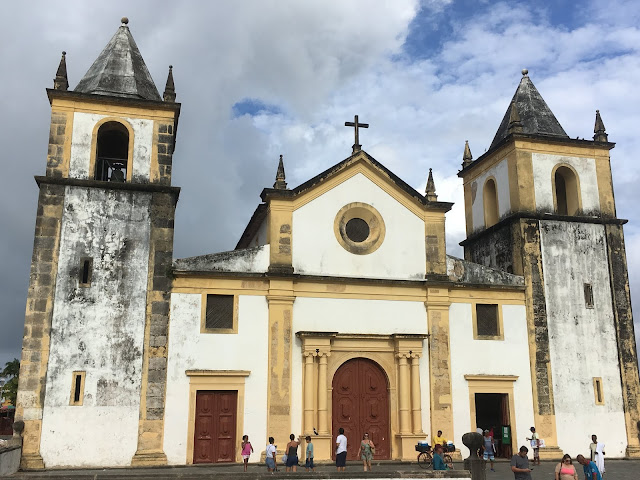Written by J. Warren:
Olinda is a city of 350,000 in northeast Brazil, the poor cousin to its adjacent city Recife, a town of 4 million. The climate is tropical- hot but the breezes from the nearby beaches help with the humidity. Olinda was founded in the early 1500s when the Portuguese first arrived in northeast Brazil. Unlike Recife, Olinda is hilly with cobblestoned streets. Both cities still have many buildings from the colonial period.
 |
| View of Recife from Olinda |
 |
| Views of Recife from Olinda |
 |
| The weather is tropcal. Many gyms are open air. |
Taking a trip to the beaches outside of Olinda brings a different perspective to life in the area. Brazilians love their beaches. For many people, there is a regular Sunday outing to the beach to relax and recharge. Some beaches are remote and quiet but most are full of the laughter and play. Need a beer? Just wait for the pump to come to you. Other vendors will also find you, frequently with a creative spiel to sell their wares. Grab an umbrella and a chair and watch the world go by.



 |
| Beer pump at the beach |
 |
| Beer pump at the beach 2 |



Work in the Community
During my time in Olinda, I had classes with a nurse who provided me with information about common diseases in Brazil and explained the ins and outs of the federally operated system of health care. The Brazilian mandate for their healthcare system would warm the hearts of Bernie Sanders and Elizabeth Warren. Citizens have a right to healthcare without cost, provided as needed and with respect. But as everyone knows, theory and practice are often feuding cousins.
I spent much of my time in Olinda working at the Sandra de Moraes Center, a non-profit that serves poor families in the surrounding community. The Center offers services to children outside of school hours to augment their education and keep them away from the gangs. “Community” is the polite term in Portuguese for a slum, appropriately named for the area. Some residents are squatters, having built houses on vacant land using whatever material they could scavenge. A nearby canal floods frequently, covering houses with fetid water. The area has 80% unemployment, likely the result of 80% illiteracy (reprise problems with the education system). I went into many of the residents’ homes with a social worker from the Center. She asked the residents about their health conditions (a lot of mosquito borne diseases) and access to the government’s health care system. Almost all the residents provided the same response- they cannot get appointments to see the doctor because there are no doctors. If they go to the urgent care center, often there are no doctors or medications. In short, the health care system is a mess.
 |
| Social worker from the community |
 |
| classroom at the center |
 |
| Community Residents |
 |
| Two sisters - both transgender |
 |
| New Mothers |
Carnival
Olinda and Recife are famous in Brazil for the extent of their Carnival celebrations. Both cities are known for their unusual annual Carnival traditions. In Recife, during the week before Carnival, the city constructs the Rooster at Dawn, a 100 foot tall, 3 ton chicken that sits on a bridge in the center of the city. It is the gathering point for crowds during the first official day of Carnival.
Olinda is known for its Giant Dolls carried by people during parades. If you’ve every seen the race of the Presidents at a Nationals’ game, you get the idea.
I think most Americans envision Carnival in Brazil as scantily attired women dancing down the streets a few days before Lent. Wrong. What Americans don’t understand is that in Brazil, Carnival happens long before the official dates. The first day I arrived, a month before Carnival, there were already parades down the streets of Olinda with the ubiquitous drums leading the way. And this was not an isolated event. The lynchpin of Carnival is the many groups that form parades based on different themes or musical styles. Nightly, one or more of this groups paraded down the streets, sometimes in costume, sometimes not, but always with music.
As a warm-up to the official event, there was the Parade of the Virgins. This is an annual event when mostly straight men dress as women. Many of the outfits were very clever. There were several jabs at the new Brazilian president’s conservative social policies.
As the official date for Carnival neared, people in Olinda started painting their houses and trimming their bushes. The City sent crews out to wash the cobblestones. In the dark of night, streets were decorated as were private homes. It’s similar to Christmas in the U.S. but on steroids.
And then it happened. After weeks of informal celebrations, official Carnival arrived. IT WAS CROWDED, IT WAS LOUD, IT WAS CREATIVE, IT WAS FUN. The theme of Carnival 2019 is Respect for Woman. In the past, many women have been subjected to Trump-like groping during Carnival. This year has a focus on educating men that “no means no” (“não é não” in Portuguese). Women were painting “Não é não ” on their arms, faces and chests.
During the first official day of Carnival, several important things happened. In Recife, about 3 million people gathered early in the morning around the Rooster of the Dawn trying to glimpse the rooster and listening to the music from the bypassing oversized floats that blast music loud enough to knock off your toe nails. At the same time, over 1 million people gathered in the narrow streets of the historic part of Olinda. Everyone was dressed for the event in some way, even nuns. Spontaneous drumming and dancing happened along different streets. The culmination of the day in Olinda was the appearance of the Midnight Man, a 150 pound giant doll that symbolizes the opening of Carnival. Each year, he appears exactly at midnight, parades through Olinda and returns to his resting place until next year’s Carnival.
 |
| J Walking condom |
 |
| Crowd in Olinda |
 |
| No Means No |

The second day of Carnival in Olinda was the day of Superheros. Everyone came in costume- children and adults. I saw Wolverine, Batman and Robin dancing atop a wall. Many women were dressed as Wonder Woman, including the little girls. It was great to see this in a country known for their machismo.
I am so glad that I had the experience of a few days of the event but equally glad to have fled the crowds in Olinda to spend the rest of Carnival on the island of Fernando de Noronha.
























































































